 |
|
 |
|
| About Us | Essential
Library |
Homepage Archive | Resources | Composer Links |

|
SOME PEOPLE REALLY ARE TONE DEAF: There's even a technical name for the problem: amusia. Usually, it's the result of head injury, or an illness. But some people are just born that way. All Things Considered (NPR) 01/16/02 UNDERSTANDING PERFECTION: Scientists are trying to determine why some people have perfect pitch - the ability to identify notes without other reference notes. "Based on the evidence so far, most scientists believe that genes do play at least a subtle role, perhaps by keeping a developmental 'window' open wider and longer during early childhood, when note-naming ability generally takes shape. Still, some experts argue the quest for an absolute pitch gene is akin to searching for a gene for speaking French; it doesn't exist." San Francisco Chronicle 01/15/02 IS ALL MUSIC THE SAME? "Especially in post-modern times where categories are being redefined, it is easy for many to assert that a tango, a rock tune, and a Beethoven symphony are all the same except perhaps for the musical parameters that define the style. This can have its positive as well as negative ramifications. The positive perhaps being that all types of music are understood as having similar importance, the negative that everything is considered in many ways as being the same." NewMusicBox 01/02 HISTORY OF A BACKSTAGE FRACAS: Just what the heck is going on in Edmonton, anyway? Since when do fired conductors start their own competing orchestras? And what kind of musicians are prepared to follow such a heretic? The answers are the stuff of bad TV dramas and David Mamet plays. Edmonton Journal 01/20/02 EDMONTON ULTIMATUM: "The lawyer who raised $4 million to form a new orchestra says he will give the money to the Edmonton Symphony Orchestra board instead - on one condition." The condition is that if the musicians of the ESO don't like the way the board is spending the money, they will have the right to fire the board members. If the ESO agrees (which seems unlikely,) the arrangement would be unprecedented in the history of North American orchestras. CBC 01/18/02 RIGHT OF WAY: The BBC has made a costly mistake. The corporation filmed an expensive version of Gian Carlo Menotti's Amahl and the Night Visitors that was set to air Christmas eve - "until it was found at the last minute that no one had checked who owned the copyright, and the programme had to be pulled." Seems an American company owns the film rights, and the company is not inclined to grant permission for another version. The Observer 01/13/02 WHERE ARE TODAY'S COMPOSERS? Why, at the start of the 21st Century, are our "mainstream musical tastes are still stuck so completely back then, in the 19th century. Not that there's anything wrong with listening to Wagner or Chopin, or even Mendelsson. But it is strange - isn't it? - that an absolute majority of the music performed by all the American symphony orchestras this season will be by just four guys. Four guys who were all composing music during the same hundred-year period that ended more than a hundred years ago: Mozart, Beethoven, Brahms, and Tchaikovsky. Who are our Brahmses and Tchaikovskys, the historically important composers of this time? Why don't we know their music? Why don't we even know their names?" Public Arts (Studio 360) 01/11/02 TENOR'S NIGHTMARE: It's the kind of scenario that causes performers to wake up screaming at night: for whatever reason, a singer suddenly loses his ability to sing, on stage, with thousands in attendance. It happened this week in Toronto to legendary Canadian tenor Ben Heppner, who was forced to halt a recital halfway through when he could not stop his voice from cracking repeatedly. Toronto Star 01/18/02 GEEK SQUAD 1, WRITER'S CRAMP 0: The worst part of being a composer, hands down, is the endless hours spent scratching out scores and parts for cranky musicians with dubious eyesight who are forever claiming that nothing is legible, or spaced right, or has the page turns in the right place. So what, other than a dungeon full of enslaved copyists, can make the drudgery easier? Why, a couple of British computer geeks, of course! Los Angeles Times 01/19/02 MUSIC TO THE PEOPLE: Digital music and file sharing isn't just about making copies and getting music for free - it is changing the music industry in a fundamental way. "The advent of new and accessible technologies has made the independent route much more possible. The 1960s aesthetic which caused some theatre practitioners to abandon the stage for the street, and visual artists to seek an audience outside formal galleries, has now visited popular music in a much more radical way than it did back then. The possibilities the Internet and related technologies offer to bypass major record labels and give the artist direct access to a potentially mass audience have changed the music industry forever." Irish Times 01/15/02 HOPE FOR THE DYING? Okay, so 2001 was a terrible year for the classical recording industry. The worst, in fact. "Still, if one looks hard enough, some promising signs can be gleaned from the cards dealt to recorded classical music, both in the major and independent sectors. Having survived the Tower debacle — in which the cash-strapped retailer demanded drastically extended payment terms from most of its independent accounts — a distributor like Harmonia Mundi might actually end up stronger, having now culled back its inventory and overhauled its retail sales/stock process. Universal Classics Group — a key industry barometer — finished the year not only with a bevy of crossover hits but also with the highest number of top-selling "straight" classical offerings, according to Billboard." Andante 01/15/02
|
Electronic Dialogues An Interview with Steven R. Gerber
Gerber has written for many of the major performers of our time. In addition to the concertos written for Nikkanen and Brey, he wrote his String Quartet #4 for the Fine Arts Quartet, his Viola Concerto for Yuri Bashmet, who premiered it at his festival in Tours, and several works for Russian violinist Tatyana Grindenko. His works have also been performed by such groups as the Knoxville Chamber Orchestra under Kirk Trevor, Philharmonia Virtuosi under Richard Kapp, and The Russian National Orchestra under Mikhail Pletnev. Most recently, he received a commission from Concertante Chamber Players for a work entitled "Spirituals" for clarinet and string quartet, premiered by them in 2001 in Harrisburg, New York City, and the Library of Congress in Washington, D.C.
Born in Washington, D.C. in 1948, Gerber now lives in New York City.
He has degrees from Haverford College and from Princeton University, which
awarded him a 4-year fellowship for graduate studies. His works have
been played throughout the U.S., Europe, and the former Soviet Union, where
he has toured frequently and had literally dozens of orchestral performances
and
S21: You are a remarkably prolific composer and have created works in a wide variety of forms—orchestral, chamber, choral, solo. Do you prefer one form over another? SRG:
For a long time I preferred to write solo, vocal, or chamber works
and didn't expect to write much for orchestra. When I began my Symphony
in 1988, at the age of 40, I had written only one previous work for orchestra,
some settings of Wallace Stevens for soprano and orchestra, which were
still unplayed. (I had to wait nearly 15 years for them to be performed;
oddly enough they were given two performances in Ukraine during the same
year with two different orchestras, singers, and conductors.) I Had
no idea when I would hear the Symphony, or my next work, a Serenade for
Strings, but I got
The Adams Chronicles
|
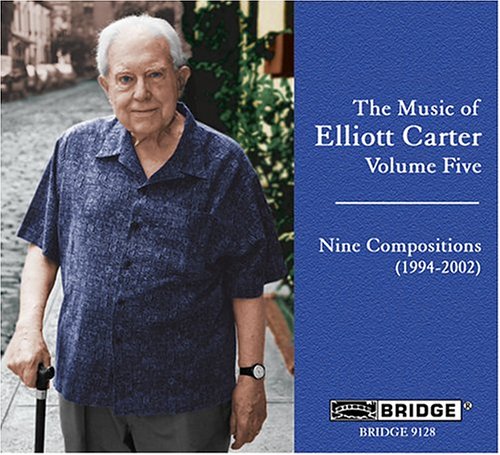
The Music of Elliott Carter, Volume Four Composer: E. Carter Conductor: Elliott Carter Performer: Susan Narucki, David Starobin, et al. Ensemble: Daniel Druckman Bridge - #9111 Volume four of Bridge's comprehensive Elliott Carter series includes the masterpiece, Eight Pieces for Four Timpani, as well as a number of short recent works. Particularly fine is David Starobin's performance of "Shard," a piece for solo guitar that is short but breathtakingly original. |
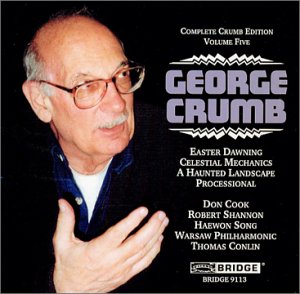
Complete Crumb Edition, Volume 5: Easter Dawning, Celestial Mechanics, A Haunted Landscape, Processional Composer: George Crumb Conductor: George Crumb Performer: Thomas Conlin Ensemble: Haewon Song , Robert Shannon Don Cook Bridge - #9113 The fifth release in Bridge's award winning Complete Crumb Edition includes the premiere recording of Crumb's1992 carillon solo, "Easter Dawning" played by Don Cook, carilloneur at Brigham Young University."Celestial Mechanics", for piano, four-hands is pure Crumb. "A Haunted Landscape" 1984) for orchestra is played by The Warsaw Philharmonic under conductor Thomas Conlin, the same combination that produced the Grammy-winning "Star-Child". |
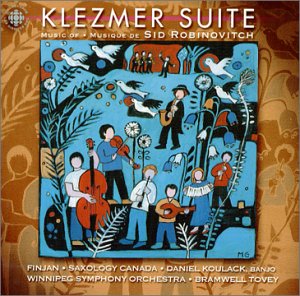
Klezmer Suite Composer: Sid Robinovitch Cbc Records --Naxos-- - #5212 |
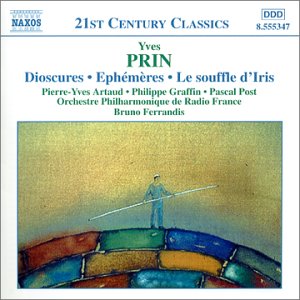
Dioscures, Ephemeres Composer: Yves Prin Conductor: Bruno Ferrandis Performer: Pierre-Yves Artaud Ensemble: Orchestre Philharmonique de Radio France Naxos - #8555347 Once you know that Prin was in Boulez's first composition class at IRCAM, the fact that all of these pieces are revisions of earlier pieces begin to make sense. Like the master, Prin is obviously a harsh critic of his own work. At 41 minutes, the disk covers a lot of contemporary territory and contains flashes of geninue originality. |
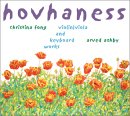
Violin|Viola and Keyboard Works Composer: Alan Hovhaness Performers: Christina Fong, Arved Ashby This disc might easily be subtitled "music to chill out by." Deceptively simple and meditative with just the right touches of exotic eastern mysticism, this is music that captivates through simplicity. A keeper. |
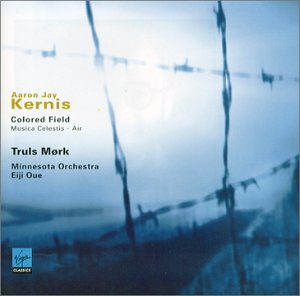
Colored Field · Musica Celestis · Air Composer: Aaron Jay Kernis Conductor: Eiji Oue Performer: Truls Mørk Emd/Virgin Classics - #45464 Some of Kernis' greatest hits retooled for Truls, who performs them magnificently.
|
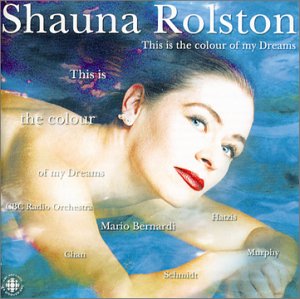
This Is the Colour of My Dreams Conductor: Mario Bernardi Performer: Shauna Rolston Ensemble: CBC Radio Orchestra Cbc Records --Naxos-- - #5214 Ralson is an enthusiastic advocate and performer of contemporary music. She has given the North American premiere of Gavin Bryar’s concerto, "Farewell to Philosophy", Rolf Wallin’s "Ground" for solo cello and strings, Krzysztof Penderecki’s Sextet for violin, viola, cello, piano, clarinet and horn, as well as the Canadian premiere of "Kai", a work for solo cello and 18 instruments by Mark Anthony Turnage. Here she delivers the world premieres of works written especially for her by Canadian composers Heather Schmidt, Christos Hatzis, Chan Ka Nin, and Kelly-Marie Murphy. |

Selected Songs Composer: Ned Rorem Performer: Ned Rorem, Carole Farley Naxos - #8559084 Pushing 80, Rorem continues to add to his extensive catalogue of over four hundred songs. His individual settings and cycles draw their texts from a wide range of poetry. Among his favorites sources have been Walt Whitman, Theodore Roethke, Kenneth Koch, Paul Goodman, and the English Metaphysical Poets. Nobody does art songs better. |
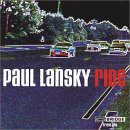
Ride Composer: Paul Lansky Bridge The title track, 'Ride', is a 19 minute piece made from sounds of a highway, processed and filtered to create sweeping sonic landscapes. An 8 channel version of the piece was played at Lincoln Center's 'Great Day in New York' festival in January 2000. |
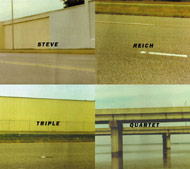
Triple Quartet/Music for a Large Ensemble/Electric Guitar Phase Steve Reich, Kronos Quartet, conductor Alan Pierson Wea/Atlantic/Nonesuch - #79546 This is the first recording of Reich’s Triple Quartet performed by Kronos Quartet, who commissioned the work and in whose honor it was written. This disc, the first to include a new work by Reich since the 1996 release City Life, also features first recordings of Electric Guitar Phase and Tokyo/Vermont Counterpoint, as well as the first recording of a newly revised edition of Music for Large Ensemble. |
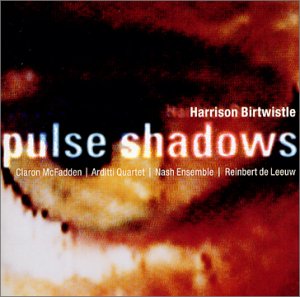
Pulse Shadows Composer: Harrison Birtwistle Wea/Atlantic/Teldec - #26867 Written for soprano, string quartet & ensemble of 2 clarinets, viola, cello and double bass, Pulse Shadows' nine string quartet movements alternate with the 'song' ensemble. The nine quartet movements comprise five Fantazias and four 'Friezes', of which the fourth is an instrumental meditation on Celan's famous poem Todesfuge (Death Fugue), with its strange recurrent image of black milk. |

Brahms · Stravinsky - Violin Concertos Composer: Johannes Brahms, Igor Stravinsky Performer: Neville Marriner Sony Classics - #89649 Thank heaven for little girls. Kid breathes new life into old workhorses. |
|
One-Minute Web Guide The essential guide to intelligent life on the internet |
Publisher: Duane Harper Grant (212) 582-4153 Editor: Jerry Bowles (212) 582-3791 Contributing Editors: Armando Bayolo, Sam Bergman, Joshua Cohen, Karina Cristina Demitrio, Deborah Kravetz (C) Sequenza/21 LLC 2000 |